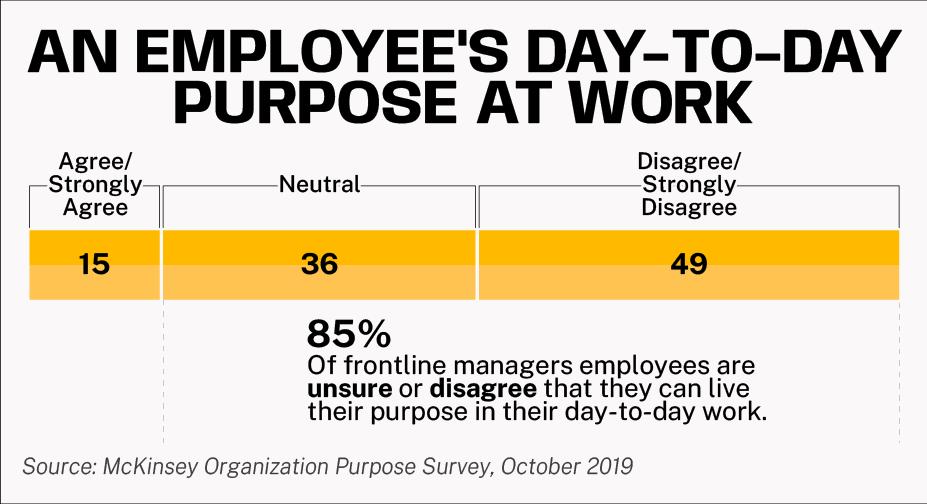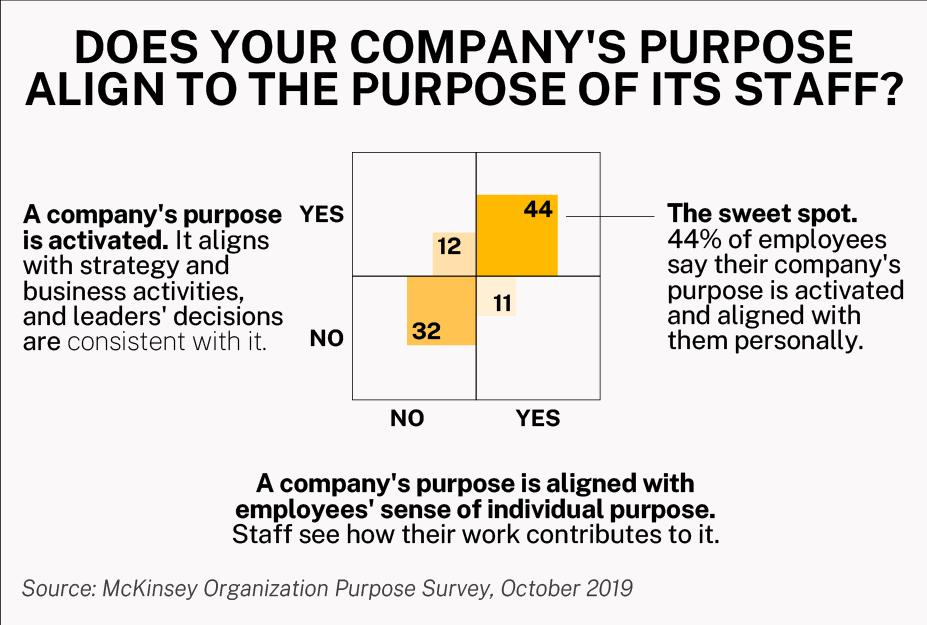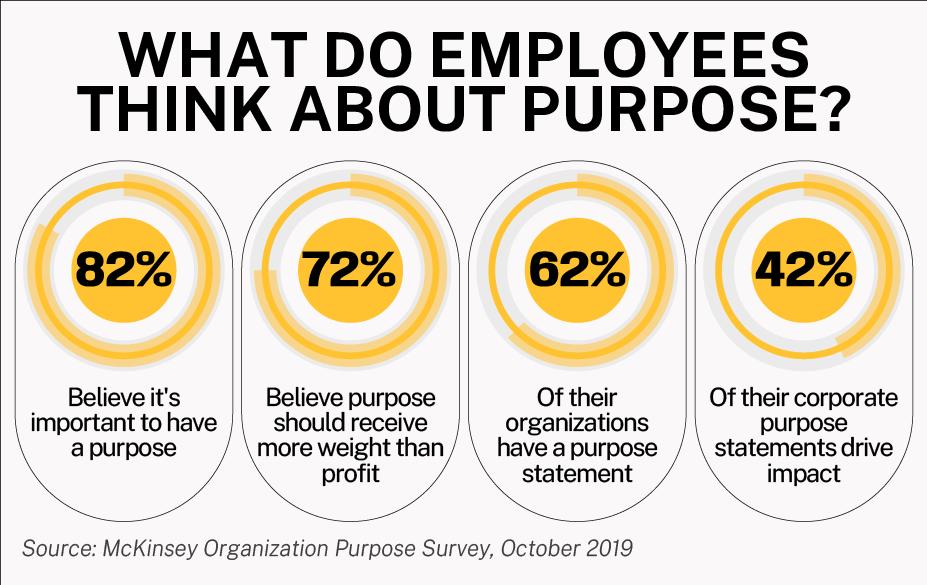
How Business Intelligence Tools are Reshaping the Telecom Industry
Explore the power and importance of telecom business intelligence and how it fuels innovation, efficiency, and strategic data-driven decision-making.
15 MIN


By: TEAM International | July 26, 2022 | 12 min
Have you ever dedicated time to reflecting on what your personal purpose is? Moreover, is your purpose and personal value linked to your current job? Now think about the jobs your company offers. Do they carry a significant source of meaning in people’s lives? As more employers ponder on the future of work, it’s time to consider the current demands of employees.
Surviving the pandemic and the many struggles that came with it wasn’t easy for everyone. During this tumultuous and uncertain time, most people continueds working from home, and many left their jobs seeking more flexible opportunities. Everyone got a chance to pause and contemplate life from a different angle. We all lost something; we all mourned life as we knew it and found, in many cases, a better way to embrace it. This shift of mind and lifestyle made employees wonder whether their jobs meet their mental, emotional, and physical needs.
As leaders think about motivators for their employees, payment may come to the top of their minds. Admittedly, salaries and wages are one of the main factors but not always a decisive one. However, today the traditional relation between offering services for a certain amount of money and calling it a deal is no longer effective. Expectations have changed tremendously, and employees wish to be understood as humans, not just as a workforce.
So, how can your company establish a human-centric environment? Start with a personal value proposition that can fulfill employees’ life purposes. One that can acknowledge their value and recognize their abilities while the company shows genuine interest in each employee’s development. A great personal value proposition example resides in the growth opportunities an employer can offer when starting a relationship with an employee. As soon as companies develop a more human sentiment towards work and the people who execute it, they will automatically build deeper connections and find ways to provide value to their people.
An organization pursuing a growth strategy needs to understand that investment in employee growth and sustainability are essential. People need to feel that their jobs are part of their personal purpose, and organizations granting those opportunities will thrive and retain their best talent..

Since many employees feel that their sense of purpose is defined by the work they do, leaders should find ways to recognize and appreciate their efforts. How can your company add value to the relationship with its employees? Personal value is the answer.
What is personal value? We all have values, but mostly a set of values differs from person to person. These differences depend on our immediate surroundings, culture, upbringing, life experiences, etc. These factors define most of our actions and motivations. At work, it’s important to align these values to create engagement and retain talent.
COVID-19 made everyone rethink the place work should have in their post-pandemic lives. Many realized what they needed from an employer and left jobs that didn’t make them feel valued. Today, beyond competitive financial compensation, people look to be part of a purpose-driven community that respects them and offers deeper relationships. So, personal value plays a vital role in the workplace and must be at the center of every strategy.
After the trauma we faced as a society, isolation and new habits have reminded us that life is fragile. Anxiety about an uncertain future has made us wonder whether what we do in life has any impact. Also, it has created a sense of urgency to focus our energy on what truly matters to us. Consequently, those who struggle to find personal value at work will most likely leave. So, don’t waste time, and leverage the following ideas to strengthen your team’s personal value:

We’ve talked about personal value and growth opportunities, both crucial to helping staff find their personal purpose. At this point, you may be wondering how you can focus efforts on helping employees live their personal values and purpose. So, below we share three important questions for you to ask yourself and managers and evaluate if you deliver:
Since the goals and values of each individual can vary, you can only control how the purpose of the company is executed. Estimate how well your leaders understand it, and make sure they recognize its influence. Keep in mind that employees will be more engaged and satisfied to work at a company that spends time reflecting on the impact it has on the world.
How confident do managers feel about sharing their personal purpose with others? This is something stakeholders should consider since many leaders are not used to being vulnerable but must set an example for the rest of their colleagues. Watch your managers closely; they establish the mood for how employees’ confidence is developed at work. Make sure they create an environment where their personal purpose and values are respected.
When 63 percent of people expect their employer to provide more opportunities for purpose in their day-to-day work, companies must deliver. Listen to what your people have to say, give them a space where they can share ideas on how to fulfill their purpose and make them part of the change. Consider that even minor tasks can be purposeful and lead to more extensive changes.

Growth opportunities are on the way for both employees and companies willing to nurture win-win relationships. Understanding that a job is a significant source of purpose will motivate employers to embrace this need or prepare to lose their talent in favor of competitors doing something about it. The choice is yours.
Organizations adapting to staff needs will demonstrate respect as they honor the evolution of each individual along with them. Moreover, when individual well-being is fulfilled, business performance is also satisfied. Consequently, modern leaders should align corporate mission and personal value with partners’ and employees’ goals to thrive together. So, are you delivering?

How Business Intelligence Tools are Reshaping the Telecom Industry
Explore the power and importance of telecom business intelligence and how it fuels innovation, efficiency, and strategic data-driven decision-making.
15 MIN

AI and Cybersecurity: Automating Incident Response Processes to Minimize Downtime and Damage
As technology rapidly evolves, cyber threats become increasingly sophisticated. Discover how AI enhances incident response, accelerates threat detection, and minimizes damage.
15 MIN

How Mobile Apps Can Improve Customer Service in the Banking Industry
Discover how BFSI companies have been adapting to clients constantly evolving needs and why a customer-centric approach is the next big move for this industry.
18 MIN